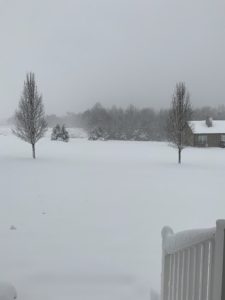Winter Precautions
If you live in our neck of the woods, you woke up to a thick blanket of snow this morning. Snow before Christmas is unusual in this part of North Carolina, but as long as the electricity stays on, I’m good with it.
Seems the older we get, the less we appreciate snow. What is often considered a delight when we are young is more likely to be dreaded as we age. Cold weather and snow can indeed be dangerous for the elderly, especially those who have physical or mental health problems.
Caregivers must be vigilant during cold weather.
Experts advise keeping the thermostat set no lower than 68 degrees. Check with your loved one often to see if he is too hot, too cold or just right. Rather than constantly adjusting the thermostat, aim at adjusting clothing by removing or adding loose layers. This is effective as the air between the layers provide warmth. Thermal underwear or hats may be needed for a person who just can’t get warm. When seated, a throw or blanket is useful for additional warmth. Caution: if the care recipient is ambulatory, make sure they do not trip over the cover when standing up.
Many elderly people balk at baths when it’s cold – and with good reason. You can get a real chill if you are not careful (and quick). Skipping a day or two is okay as long as good hygiene is accomplished by other means such as a bed bath or a “wash-up” and change of clothes. If you do opt for a bath or shower, throw a dry towel in the clothes dryer as you begin, and use the warmed towel for drying. Keep a cozy robe ready for cover and dress as soon as possible.
It is really challenging to sleep well when you are cold. I remember long-ago winter nights in the unheated attic-like upstairs, hunkered down under layers and layers of quilts. Today, in addition to whole-house heat, we have electric blankets, heated mattress pads and micro-fleece sheets (the fuzzy ones) that feel warm to the touch. Use any and all to create a comfortably warm sleeping environment. Doctors do advise to use caution when using electric heating products with anyone who is infirm, so ask first. One alternative for the cold natured is to “preheat” the bed by placing a heating pad between the top and bottom sheets for a few minutes before bedtime. Make sure the pad is turned off and removed once your loved one is in bed. For additional warmth, use one or two lightweight blankets. Tuck the covers in loosely so they do not inhibit desired repositioning.
Hypothermia – a serious, even potentially fatal condition that results when a person’s body temperature becomes abnormally low (95 degrees or lower) can occur inside a very cold house. Frail and elderly people are vulnerable, so during cold spells it is imperative to check frequently on those who require care. Intense shivering, pale skin, incoherence, slurred speech and excessive drowsiness are symptoms. If you suspect hypothermia, wrap the person in a blanket, being careful to cover the head and neck since about half of all body heat is lost from that area. Call 911 immediately. Do not rub the person’s extremities or try to warm with a heating pad or bath.
A bothersome consequence of cold weather is low humidity, which results as heat dries out the air. Common symptoms are dry skin, irritated sinuses, scratchy throat and itchy eyes. Long-time exposure can lead to inflamed mucous membrane in the respiratory tract that increase the risk of colds and other infections including the flu. A hygrometer (humidity monitoring advice) can be purchased for less than $10 and is a good investment. Methods of increasing your home’s humidity, however, may be more costly. Many types of humidifiers are available. Other remedies include hanging wet laundry inside to dry; keeping a pot of water simmering on the stove; or placing a metal or ceramic bowl full of water on heat registers. Aim for a humidity of 40 to 50%.
Use extreme caution when taking your loved one outside when the temperature is below freezing or when snow or ice is falling. Unless it is an emergency, play it safe and stay inside.
Heeding these reminders will help insure that you and your loved one have a comfortable and healthy winter season. Stay warm!